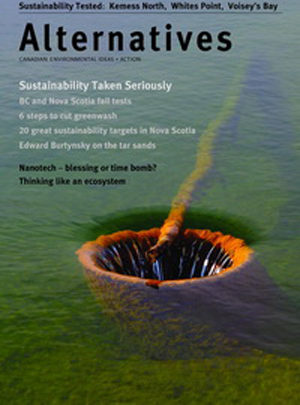It’s not that we don’t know how to determine if a project is sustainable. More often it’s that we fail to apply the tests that exist.
This issue of Alternatives describes the many ways that we can test the sustainability of a project, a product or a service. It features concrete examples of progress toward sustainable development, lending credibility to this highly overused and largely misunderstood term.
It’s not that we don’t know how to determine if a project is sustainable. More often it’s that we fail to apply the tests that exist.
This issue of Alternatives describes the many ways that we can test the sustainability of a project, a product or a service. It features concrete examples of progress toward sustainable development, lending credibility to this highly overused and largely misunderstood term.
 Read selected articles and web extras from this issue
Read selected articles and web extras from this issue
Here’s what else you get when you buy the issue:
Letter From Bhopal
Explicit sustainability tests are emerging to help ensure that new initiatives preserve ecosystems, maintain viable livelihoods and deliver quality-of-life gains.
Power of the People – Don Mullin
A strong sense of place swayed the review panel to reject the Whites Point quarry proposal.
Legislating Sustainability – John Brazner
Nova Scotia’s new law marries environmental sustainability and economic prosperity.
Raising the Bar – Jode Roberts
Because the Earth needs a good lawyer.
Sustainability — The Very Idea! – Kent A. Peacock
The Smallest Revolution – Stephen Bocking
We need to learn more about nanomaterials before they get too far under our skin.
The Danger of Misinformation – Gordon McBean
The Deniers is so full of misinformation that it is impossible to list it all.
Review: Canada’s Deadly Secret – Petr Cizek
Canada’s Deadly Secret by Jim Harding
Publication of this issue was made possible by The Gosling Foundation; The Salamander Foundation; and the support from our many subscribers. We acknowledge the financial support of Canada’s International Development Research Centre (www.idrc.ca); EJLB Foundation; Friends of the Greenbelt Foundation; The McLean Foundation; Ontario Media Development Corporation; Ontario Trillium Foundation; Ontario Work Study Plan. We acknowledge the financial support of the Government of Canada through the Canada Periodical Fund (CPF) of the Department of Canadian Heritage toward our project costs. The support of the Faculty of Environment at the University of Waterloo and the Waterloo Environmental Studies Endowment Foundation is appreciated.’






 Read
Read 






